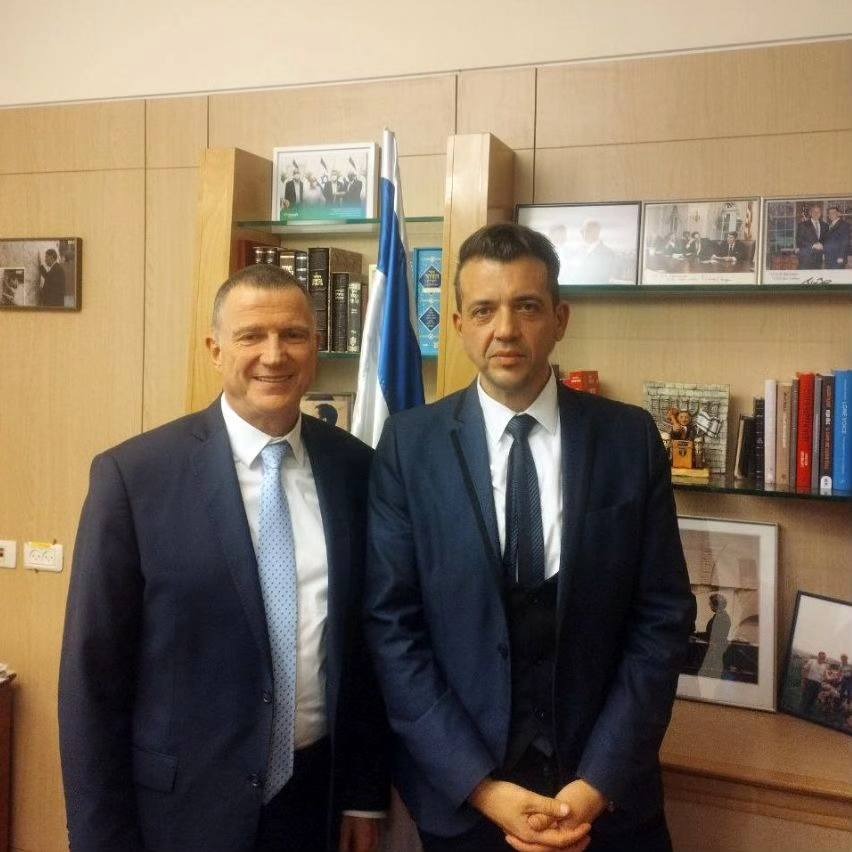‘If Social Media Existed in 1944, Nazi Germany Would Have Won’
"All Eyes on Rafah" mobilizes millions with bot farms from China, Russia, and Iran, as Israel fights the information war. Experts discuss the coordinated online efforts against Israel by Iran, China, and Russia.
Since Hamas’ October 7 attacks on Israel and throughout the ongoing war in Gaza, social media has become a crucial battleground for public opinion. Israel is watching warily as pro-Palestinian campaigns, some of which have been traced back to bot farms, gain significant traction globally.
An AI-generated image with the text “All Eyes on Rafah” went viral late last month, with over 44 million users sharing the post on Instagram and nearly 28 million sharing the post on the social media platform X. The post was inspired by the Israeli military’s action in the southern Gazan city of Rafah, where hundreds of thousands of Palestinian civilians are sheltering. It was shared by celebrities such as Bella Hadid and Susan Sarandon.
The hashtag #FreePalestine garnered over 1.5 billion views across multiple platforms, becoming 80% more widespread than pro-Israel hashtags.
Social media has also been used to spread unverified claims, including claims about the explosion at Gaza’s Al-Ahli Arab Hospital in mid-October that were later found to be false.
In November, only one month into the war, the Israeli government had submitted approximately 9,500 content removal requests to platforms like Meta, according to media reports, achieving a 94% compliance rate. Israel also invested heavily in tracking and analyzing bot activity on TikTok, Instagram, and X.
The Media Line spoke to experts about the unfolding social media battles.
“We can say with absolute certainty that massive bot farms are directed at anti-Israel campaigns, with a lot of accounts on TikTok, Instagram, and Twitter,” Ezra Mor, an Israeli politics and war blogger, told The Media Line. Mor has 23,500 followers on Instagram and 44,800 followers on YouTube, and his YouTube channel has approximately 18 million views.

Israeli politics and war blogger Ezra Mor. (Natali Sakovsky)
Roman Kaplun, a cybersecurity entrepreneur who heads an organization focused on fighting anti-Israel information warfare, told The Media Line that bot farm attacks on Israel have been coordinated internationally on a large scale.
A massive attack was launched using Iranian, Russian, Chinese, Pakistani, and Indian cyberfarms
“A massive attack was launched using Iranian, Russian, Chinese, Pakistani, and Indian cyberfarms,” Kaplun said. “This huge production began generating a massive amount of anti-Israel content all at once. These are billions of bots on all social platforms, and as far as we know, it is funded by Arab money.”
He said that billions of dollars have been invested into anti-Israel cyberwarfare.
Mor said that many countries now use automated bots to post on social media with nearly no human input. Russia and Iran still use more primitive bot farms that involve more workers.
The social media campaigns promoted by these bot farms have significant impacts on internet users’ worldviews, Kaplun said.

Roman Kaplun (R) with Member of Knesset Yuli Edelstein. (Courtesy)
“Our data matches the findings of many investigators and institutes, even data provided by Israeli services, which was confirmed during our visit to the Knesset,” he noted. “We see that it significantly changes people’s consciousness.”
Asa Shapiro, head of marketing and advertising studies at Tel Aviv University’s Communications Department, told The Media Line that pro-Palestinian campaigns succeed because they appeal to viewers’ emotions.
The “All Eyes on Rafah” campaign was successful because it led viewers to identify with what they understood to be the weaker side in the conflict, he said. That emotional response in turn drove higher engagement, leading social media platforms to promote the content to more viewers.
If social media platforms existed in 1944, then Nazi Germany would have won
“I have heard from someone that if social media platforms existed in 1944, then Nazi Germany would have won,” Shapiro said. “More German citizens died during the attacks of the US and Britain than British citizens. We should all ask ourselves, have we lost sight of what’s right and what’s wrong just because we’re counting bodies?”
Shapiro also attributed the popularity of anti-Israel content on social media to antisemitism.
“If by comparison we see the way the West has dealt with, for example, Afghanistan, we see that Israel is held up to a different standard,” he said.
Mor, the Israeli politics blogger, said that antisemitic and anti-Israel biases also make it harder for Israel to promote its own narrative on social media.
“Israel is forced to meticulously plan every step in the information space, double-check every piece of information. It takes Israel four to five days to verify satellite images, calculate the trajectory of a rocket, review all video materials, and only then, after five days, make an official press statement,” he explained.
Israel is working on new systems to address anti-Israel content online, Kaplun, cybersecurity entrepreneur, said. He explained that the country’s current systems are outdated and focused mainly on Iranian spoofing attacks.
Updating those systems is expected to be expensive, with a platform for Facebook expected to cost at least $20,000 plus the cost of servers.
Shapiro called on Israel to collaborate directly with social media platforms.
“The only way forward for Israel is talking with the platforms themselves and having them come to an agreement about how we can maintain a fair discussion,” he said.
The Media Line also spoke with Mohammad Saba’aneh, a Palestinian influencer and cartoonist with 48,000 followers across Instagram and X.
“Israeli narrative and propaganda dehumanizes Palestinians in Gaza since the beginning of the war,” Saba’aneh said. He aims to “rehumanize the Palestinian people” through his art.
Saba’aneh said that media reports on the war in Gaza have spread a false narrative. “Media is mentioning that Israel is under attack. It’s not true. It’s the Palestinian civilians who are under this attack,” he said.
He said that Israel has spread fake and misleading news stories about the war.
“I remember that Israeli leaders have said that they have found many kids that were beheaded on October 7, or women that were raped. All of this is fake news that came from Israel. We haven’t seen any photos, we haven’t seen any evidence about that,” he said.
The UN’s envoy on sex crimes reported in March that Hamas fighters committed rape on October 7 and likely sexually abused hostages following October 7 as well.
Although mentioning Israeli propaganda that dehumanizes Palestinians, Sabaaneh couldn’t name any specific cases.
“I cannot mention examples but there are many. Media is mentioning that Israel is under attack. It’s not true. It’s the Palestinian civilians who are under this attack,” he said.
“I do believe that more than 40,000 people who have been killed in Gaza are not Hamas. Most of them are children and women,” he said.
The Health Ministry of the Hamas-controlled government reports that approximately 37,000 Palestinians in the Gaza Strip have been killed in the war. The Government Media Office in Gaza has claimed that 69% of the fatalities were women and children (27% women, 42% children).
However, the UN Office for the Coordination of Humanitarian Affairs recently revised the figures that it publishes, based on the fatalities that the Gaza Health Ministry says are specifically identified (or confirmed), a figure that now stands at 24,686 people. Among these, 52% are reported to be women and children (4,959 women and 7,797 children).
In a May interview for the “Call Me Back” podcast, Israeli Prime Minister Benjamin Netanyahu stated that approximately 14,000 combatants and 16,000 civilians had been killed in the Gaza Strip. He provided similar figures during interviews with Phil McGraw (Dr. Phil) earlier that month and with Politico in March.
Saba’aneh also described the comparison between Hamas and the Islamic State group as propaganda.
He rejected the idea that online anti-Israel sentiment is driven by international bot farms.
“Let us evaluate the situation from all of these American universities,” he said. “People in the streets in London, in the United States, in all of these European countries, all of these people are not supported by Iran or Russia. These people support Palestine out of their beliefs.”
Saba’aneh condemned explicitly antisemitic and violent slogans such as “Gas the Jews” or “Death to Israel, Death to America.”
“I’m not against the Jews. I have Jewish friends,” he said. “I cannot say ‘Death to the United States,’ because I have friends and colleagues there, and I love to hang out in this beautiful country.”
It’s not just about the Israeli hostages. The Palestinian people are also hostages.
The Israeli hostages still held in Gaza have received undue media attention, Saba’aneh said.
“It’s not just about the Israeli hostages. The Palestinian people are also hostages,” he said. “My brother is now in an Israeli prison without going to court for more than seven months. All these 10,000 Palestinians in these Israeli prisons, they are hostages. Even if they have done anything against the Israeli government, it is because we are fighting against occupation. These are not crimes. We cannot just keep talking about Israeli hostages.”
According to the Palestinian prisoners’ rights organization Addameer, around 3,600 Palestinians were held in Israeli prisons under administrative detention as of April. Israel’s policy of administrative detention allows the government to hold suspected terrorists indefinitely without filing charges.
When taken out of context, purely numerical comparisons such as these—116 hostages held in Gaza versus more than 3,000 administrative detainees held in Israel—can be misleading. Shapiro, the marketing professor, noted that decontextualized comparisons of this sort are all too common.
“The tragedy of it is that broken moral compass where the way people see conflict is only based on the questions of how many people are getting hurt,” he said, “and not on the intention of the sides of the conflict.”
Some pro-Israel social media influencers are driven to change this narrative. Since October 7, Daniel Braun, a social media influencer and TikTok comedy star with 2.7 million followers, has devoted his online platforms to advocacy for Israel.

Daniel Braun. (Courtesy)
“My audience is very broad, from different countries, and now they are exposed to the whole new side of Israel that they didn’t know in the past,” Braun told The Media Line. “Since I’ve changed my content to be pro-Israel, I wake up every morning with a purpose.”

